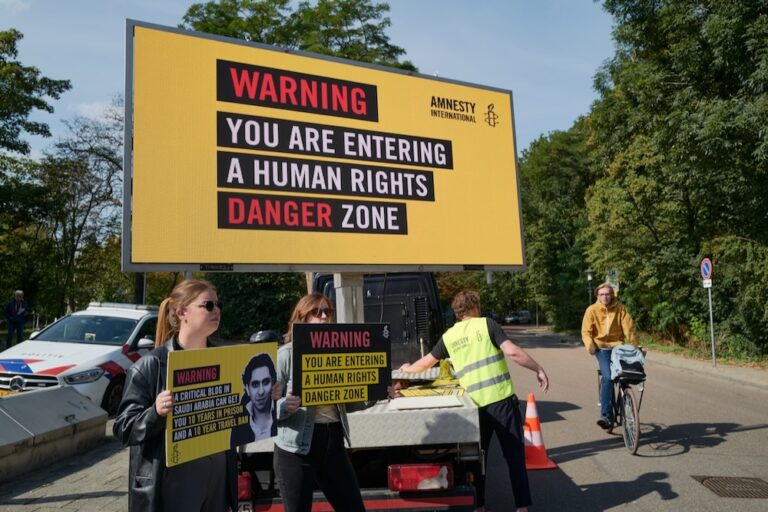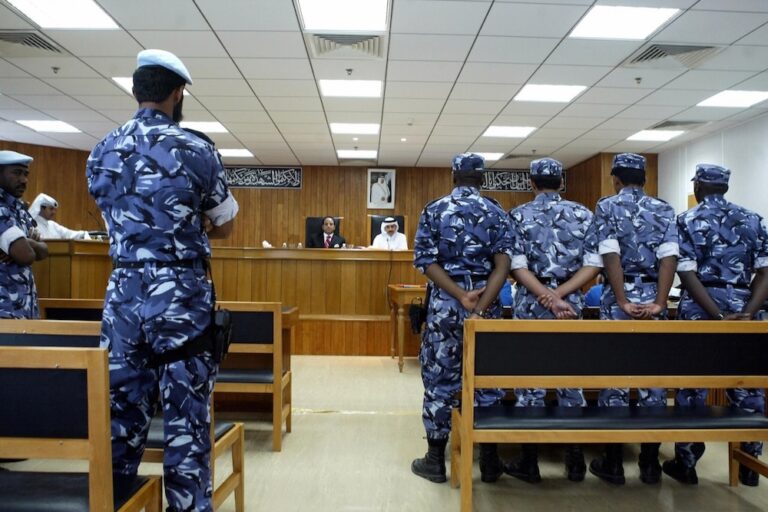Blogger and human rights activist Raef Badawi’s sentence for “insulting Islam” was increased by a Jeddah criminal court on appeal on 7 May to 10 years in prison, 1,000 lashes and a fine of 1 million riyals (200,000 euros).
UPDATE 4 September 2014: Saudi court upholds 10-year sentence for cyber activist Raef Badawi (RSF)
Reporters Without Borders is appalled by the long jail terms that three Saudi cyber-activists received this week.
Blogger and human rights activist Raef Badawi’s sentence for “insulting Islam” was increased by a Jeddah criminal court on appeal on 7 May to 10 years in prison, 1,000 lashes and a fine of 1 million riyals (200,000 euros).
“The severity of the sentence is shocking,” said Reporters Without Borders research director Lucie Morillon. “We urge the authorities to release Badawi and to quash his conviction, which is emblematic of the way freedom of expression and information are suppressed in Saudi Arabia.
“The authorities must stop putting pressure on all those who dare to voice opinions that are at variance with those permitted and must stop systematically using religious grounds to gag all political opposition.”
One of the founders of the Liberal Saudi Network, an online discussion forum that aimed to encourage political and social debate in Saudi Arabia, Badawi has been held in Jeddah’s Briman prison ever since his arrest in June 2012. The forum has been closed.
Badawi was accused of contravening article 6 of a cyber-crime law that says “participating in the production, preparation, circulation or storage of content that undermines public order, religious values, public decency or privacy, by means of information networks or computers (…) is punishable by a prison sentence, fine or other penalty.”
In July 2013, a lower court sentenced him to seven years in prison and 600 lashes on charges of violating Islamic values and spreading liberal ideas. The prosecutor had requested a harsher sentence for “apostasy,” a charge that carries a possible death sentence.
Liberal Saudi Network president Swad Shammari told Agence France-Presse that Badawi was accused of “criticizing the religious police” and “certain activities and fatwas by ulemas,” especially clerics who are members of the Committee for the Rule of Virtue and Repression of Vice, a government body that oversees the religious police.
She added that it was clerics, not the government, who brought the complaint against Badawi.
Describing his sentence as a blow to freedom of expression and online freedom of information, the Arabic Network for Human Rights Information said it was yet another example of how the Saudi regime uses charges involving Islam in order to eliminate its political opponents.
Waleed Abu Al-Khair, a human rights lawyer who had defended Badawi, was himself arrested on 15 April. He is being held at Riyadh’s Al-Ha’ir prison pending trial on 28 May.
Two bloggers based in the eastern governorate of Al-Qatif received jail sentences under articles 6 and 13 of the cyber-crime law on 6 May in connection with the websites they created.
Sheikh Jalal Mohamed Al-Jamal, who was arrested on 25 February 2012 and released on 5 May 2013, was sentenced on appeal to five years in prison and a fine of 50,000 riyals (10,000 euros). The authorities claimed that his website, Awamia.net, “attacked the Saudi state.”
Ali Jaseb Al-Touhifah, who has been held since 1 August 2012, was sentenced to six years in prison and a fine of 50,000 riyals.


